Emotional/Psychological Disorders
Acupuncture & Chinese Medicine for Nightmares
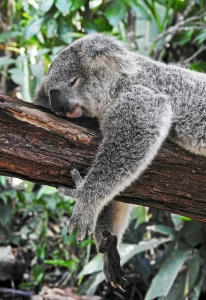
I’m not sure if what my toddler experiences qualifies as nightmares—she’ll occasionally yell out in her sleep—defiant demands, such as: “I don’t want one! I want TWO!” or, “No, put me down!” which my wife and I imagine are healthy reenactments of infuriating boundaries one of us had to regularly and/or recently hold with her.
For most adults, with greater awareness, a resume of more hardship to induce greater fears, real traumas, and fabricated neuroses, nightmares can be much scarier than being limited to one cookie. Per usual, (in Chinese medicine) they can be the result of a variety of mechanisms (none of which are mutually exclusive to the obvious psychological aspect), however all with one end result: “(Jue Yin) Blood Deficiency.” What is “Jue Yin Blood Deficiency?”
Generally, this means a person is lacking in fluids, such as blood and organ fluids, as well as inhibitory hormones and/or neurotransmitters, such as melatonin, dopamine, or serotonin. Without ample inhibitory substances, excitatory substances have no anchor—they will flare, whether in the form of emotional dysregulation, insomnia, night sweats, or NIGHTMARES.
I read one small study that demonstrated that people who suffer with nightmares also have a blunted cortisol awakening response, which is to say they feel exhausted upon waking, even after a good night’s sleep. Another study showed that specifically ADHD patients are three times more likely to report nightmares. Both instances suggest neuroendocrine disruption due to a deficit of stimulatory hormones, which might seem counterintuitive, as we might suspect that someone in the throes of a nightmare must be overstimulated. In fact, Chinese medicine and modern neuroscience seem to agree that these patients are in fact under-stimulated.
Activating hormones and neurotransmitters do not only activate the mind—they also stimulate the organs, via the hypothalamic pituitary axis, to properly do their jobs, part of which is to produce more substances to harmonize chemical balance in the body.
Stress can dry out these substances, as can poor sleep habits or poor diet. If stress is the cause it is advisable to seek therapy and/or meditation or some kind of spiritual context to reframe one’s suffering. Acupuncture would likely revolve around the gallbladder, liver, stomach, and pancreas vessels. Herbal medicine might revolve around bupleurum, ginseng, licorice, and/or pinellia root.
If someone’s diet is lacking in proper fat or protein this can lead to hypoactivity. Acupuncture might revolve around the stomach, pancreas, and liver vessels, plus the kidney instead of the gallbladder. Herbs might revolve around red dates, rehmannia root, angelica, and/or aconite.
If someone’s diet is excessively fatty or rich, this obviously creates inflammation that suffocates the organs, which causes the illusion of hypoactivity—in fact the organs are working overtime, exhausted as a result. Acupuncture would definitely revolve around the gallbladder and stomach vessels, probably the large intestine, as well as points on the abdomen itself. Herbal medicines might revolve around coptis root, gardenia fruit, and bamboo paper. In call cases points along the scalp above the hypothalamus and/or amygdala can be helpful.
If you or someone you know deals with any kind of nightmares or sleep disturbances, Chinese medicine can absolutely help… unless you live on Elm St. Wishing everyone restful sleep!
Chinese Medicine on Fainting, Dizziness
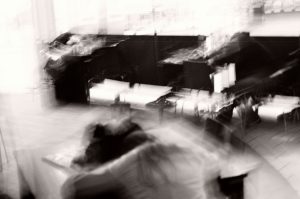
A friend of mine recently expressed having experienced great bouts of dizziness and fainting during the third trimester of her last pregnancy, which was in the dead of summer and was thus not surprising. I felt bad to hear of her struggles, but grateful that it inspired an idea for a new entry, on how Chinese medicine views fainting and dizziness, whether in pregnancy or not, and how we can treat or prevent it.
As with any Chinese medical diagnosis, the specifics get complicated, but we can still relatively easy to simplify into a couple of broad strokes. With any manifestation of dizziness, whether orthostatic, vertigo, passing out, or anything else, we are considering patterns of either blood deficiency, dampness, or a combination of the two, the latter of which obviously being the most difficult to treat. The final one is where your toddler at home forces you to “dance” with her around the house by spinning endlessly, for which there is no cure.
Blood Deficiency: More common in vegans, vegetarians, and pescatarians (most likely descending order), more common in women (especially while pregnant), the elderly, or anyone on long-term medications, which compromise the body’s absorption and capacity to produce blood. There is either a lack of cerebrovascular fluid or its flow and the head becomes faint.
Recommended treatment is herbs and moxibustion (acupuncture not as effective here), red meat or eggs, and earlier bedtimes.
Dampness: More common with obesity, more common in men, and/or people who consume a lot of alcohol, sugar, dairy, or raw foods. The microbiome grows congested with fluid retention, so the pathway by which our cellular energy carries healthy fluids to the brain is obstructed. “The clear yang qi cannot rise,” as we say, and our clarity or stability suffer.
Recommended treatment is minimizing all of the aforementioned foods, herbal medicine for 1-3 weeks to purge fluid retention, and acupuncture, especially along the vertigo line along the scalp located directly above the top of the ears. Note, this point will not be as effective on blood deficiency patterns, who are suffering a pattern of “deficiency,” not “excessive damp,” which responds better to aggressive manual treatment. As for self-care, drink hot ginger tea and black teas until symptoms subside.
Combination Blood Deficiency/Dampness: This is most common in pregnant women and very difficult to treat, because to nourish blood we must generate fluids, but to resolve dampness we must purge it. Not to mention the fact that we must be careful with purging fluid retention in pregnant women, since the fetus is ultimately a form of fluid retention—albeit an adorably magical one.
Dizziness and vertigo are serious conditions, not generally life threatening, although potentially dangerous when leading to the physical risks that accompany fainting. As always, Chinese Medicine can have much to offer in the way of hands-on treatment, internal medicine, and recommended self-care.
When in doubt: red meat, eggs, ginger tea, good rest, and steamed vegetables for the dampness.
How Much Sex is Healthy?
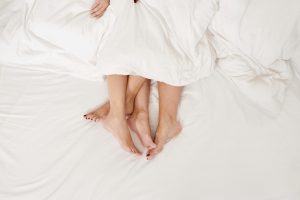 Not a frequently addressed subject in western medicine, most likely mostly because they don’t have a strong point of view, possibly also due to society’s repression on the matter. Is sex healthy, and if so, how often?
Not a frequently addressed subject in western medicine, most likely mostly because they don’t have a strong point of view, possibly also due to society’s repression on the matter. Is sex healthy, and if so, how often?
Generally, the answer is yes, sex is healthy, although most of us have heard stories of people—usually men—going into cardiac arrest and dying in the act. Much more common is the experience, also predominantly for men, of feeling exhausted or depleted immediately following. The French nickname the orgasm, le petit morte, or “little death.” The Chinese believe our “jing,” or fundamental physiological essence is stored within ejaculatory fluids, especially those of men. Supposedly women’s jing is stored more in placental fluids and lost through pregnancy and childbirth. Yet I have never heard a medical professional, beyond my own colleagues and teachers, discuss the issue.
Supposedly, up until our mid-20’s we have a relatively unlimited reserve of “jing,” and afterwards, we should be more mindful of how much we expend. I can’t relay a one-size-fits-all rule, but based on what I’ve read, in our thirties a few times a week is considered healthy, in our forties and fifties about once a week, and a maximum of a few times per month in our sixties and beyond. Any more would expend too much—any less could create stasis in the urogenital microbiome, which could send inflammatory heat upwards to the central nervous system. In other words, extended dry spells create stress. Overindulgence creates weakness.
Supposedly, sex is healthier than masturbation, first because of how supportive it is for the psyche, and how the “fire element” of the mind and heart balances the “water element” of our kidneys, or adrenal health. In theory, depletion of the latter might explain why overexcitement of the former can be the final straw to cardiac arrest. Secondly, although in the process men lose jing no matter what, it is hypothesized that by absorbing their partner’s genital fluids, jing is supplemented. There are ancient Taoist practices of men withholding their ejaculation or ejaculating “internally” to conserve, though this is not advisable in my opinion, without proper guidance and instruction.
According to the circadian clock of Chinese medicine, the optimum time to have sex is in the window of the pericardium, from 7-9pm, which would make the least healthy time between 7-9am, which is generally not a problem for people with small children. Besides the “ministerial fire of the pericardium” being weaker in the morning, most of us would have to still pursue our day’s activities sans the healthy physiological fluids we are intended to transform into cellular energy. In moderation, it’s probably fine. To mitigate the “side effects” of morning sex we might recommend taking it as easy as possible, consuming eggs and animal protein, and staying hydrated. Another potentially ideal time could be between 5-7pm, which corresponds to the kidneys, whose qi is largely responsible for our sexual health. Any time in the evening offers the virtue of rest following the act.
Don’t get me wrong. I don’t believe we are meant to have much jing left when we die—in fact its complete desertion is considered the cause of death when biomedicine cites: “natural causes.” I believe in “leaving it all,” as they say in sports, as jing is expended not only through sexual activity, but through all our worldly pursuits and great effort in life. However, signs of premature “jing deficiency” usually pertain to the brain and bones, or any manifestation of looking older than one’s age. Neurological diseases, osteoporosis, loss of hair or its color in our twenties might all point to jing vacuity. I hope this provided some interesting insight in a realm where almost no clinicians do.
Total Solar Eclipse, 2024!
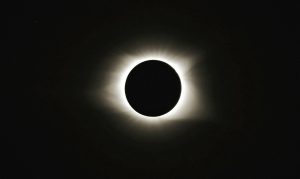 Astrology is a bit like politics, in that I try to feel out the room before bringing it up to risking being alienated as the kooky, New Agey “acupuncture guy,” who believes in everything unproven. In fact, I feel I owe it to my profession, a system of medicine that has been repeatedly proven, to keep my affinity for the subjective or ethereal realm on the hush, at least until I’ve established some degree of intellectual and/or emotional credibility in the space.
Astrology is a bit like politics, in that I try to feel out the room before bringing it up to risking being alienated as the kooky, New Agey “acupuncture guy,” who believes in everything unproven. In fact, I feel I owe it to my profession, a system of medicine that has been repeatedly proven, to keep my affinity for the subjective or ethereal realm on the hush, at least until I’ve established some degree of intellectual and/or emotional credibility in the space.
Although I’ve heard of a few practitioners that take into consideration (Chinese) astrology when diagnosing patients, my understanding is that the two paradigms have nothing to do with one another. The fact that they often attract similar people is more a byproduct of western society in recent generations. I doubt during the Han Dynasty (206 BCE) in ancient China the acupuncturists were more inclined to be wary of Geminis, attracted to Pisces, or signed up for an ayahuasca retreat.
With that said, I enjoy astrology. I enjoy the psychology of it, the character trends and tendencies, and over the years I’ve observed obvious proclivities in each sign to offer part of the explanation for why people are the way they are.
On the other hand, I’ve never gotten excited about astrological forecasts. “What’s to come” for me this month or even this year, I take with the same grain of salt I do the meteorological 7-day forecast. Maybe I should, but I don’t write out my desires or intentions at each month’s new moon, frankly because when I did in the past I was always just disappointed!
However, I am quite excited and intrigued about the upcoming solar eclipse this Monday, April 8th. Supposedly a total solar eclipse is a time of major new beginnings, potentially coinciding with major terminations in our lives that are largely outside of our control. If nothing else, for something this unique I’ll at least take some time to observe, do some prayer or meditation, and dust off the old astrology pad for a list of intentions .
But don’t listen to me ramble on about it. I wouldn’t necessarily label astrology even a hobby—it’s more an interest of mine—and definitely not my formal education. If you’re curious about next week’s eclipse, I highly recommend the long-time astrology guru of NYC, Susan Miller’s Astrology Zone, here: https://www.astrologyzone.com/all-about-eclipses-a-guide-for-coping-with-them/
Good luck with everyone’s new beginnings, and see you on the other side!
When is Stress Actually to Blame?
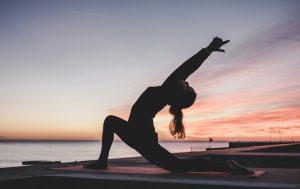 I feel like in the 20th century no one was talking about stress as an etiology for disease. Possibly I am guilty of generational egocentricity, having barely reached the drinking age by 2000. Thankfully, I had very few young friends discussing ailments and how they came about.
I feel like in the 20th century no one was talking about stress as an etiology for disease. Possibly I am guilty of generational egocentricity, having barely reached the drinking age by 2000. Thankfully, I had very few young friends discussing ailments and how they came about.
Still, I think it is more referenced, even over-diagnosed nowadays, especially by western doctors any time they cannot explain a symptom or its etiology, shrugging shoulders and throwing their arms up, citing the most probable suspect. “Might just be stress,” they say, which for its listener might feel an implication that their complaint is a fabrication of the mind, if not something that can only be resolved or improved once everything in life is good, or they achieve spiritual enlightenment, neither of which are in the cards for most of us this go around.
While I’m all for patients having agency over their own health, things happen that are out of our control—an accident, post-viral symptoms, genetic predispositions, or just life—when it helps to have a knowledgeable clinician to provide valuable insight and hopefully effective treatment.
In Chinese Medicine stress is said to have a drying effect on the body. This is why when people “stress eat” they crave “damp-causing foods,” such as cheese, bread, and sugar.
Unfortunately, such foods do not generate healthy fluids, nor is stress-induced dryness the kind that will drain pathogenic dampness. Instead, the drying effect of stress refers to the depletion of mucosal organ fluids, beneficial stomach fluids (anyone get acid reflux or diarrhea when over-stressed?), and/or those that lubricate our orifices, gyri and sulci of the brain. Although hydration is advisable, drinking water cannot replace these fluids.
In early stages or mild cases, the best way I know to restore such fluids is through rest, sleep, and the consumption of eggs, bone broths, or red meats. For the rest of us herbal medicine is necessary. Herbs such as ginseng or licorice for the gut, puerariae root for the head and neck, ophiopogonis for the intestines, atractylodes for the intestines, trichosanthis for the orifices, or rehmanniae for the brain and blood. Always consult a (real) herbalist before taking.
Although extensive periods of stress are never helpful, it is important clinically, to thoughtfully discern between when stress is, and when it is not the primary cause of a particular symptom. Almost everyone in modern society has at least moderate degrees of stress, yet everyone is walking around in enormously different stages of health or discomfort.
From our perspective, when stress directly brings up a symptom, it informs us that dryness is probably at its root of imbalance. The body couldn’t tolerate any further depletion of fluids. Then, and only then, is when stress is to blame—not to mention the fact that most disease is multi-factorial. Systemic dryness is likely only part of the picture, which is why many people “do all the right things”—exercise, meditation, good sleep hygiene—but still experience symptoms. Because it is almost never “just stress.”

